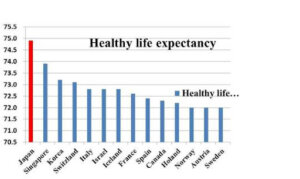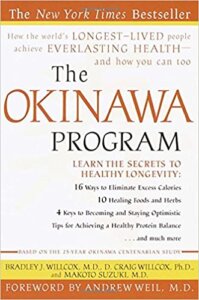“At 80, you are merely a youth. At 90, if your ancestors invite you into heaven, ask them to wait until you are 100—then, you might consider it.”
If you ever get the opportunity to visit Japan and are fortunate enough to be in a position to do so, a little stone sign in the town of Ogimi, in the rural north of Okinawa’s main island, has a few phrases engraved in Japanese that can be translated as above.
This isn’t blustered.
At the time of the last census, 15 of Ogimi’s 3,000 residents were centenarians.
One hundred and seventy-one are over the age of ninety.
Japan has been ranked as the country with the highest life expectancy and also the longest and healthiest life span for nearly two decades.
Okinawa, an island south of mainland Japan, is one of five “blue zones” throughout the world, according to the author and National Geographic explorer Dan Buettner, where people live the longest and happiest lives.

Sardinia, Italy; Nicoya, Costa Rica; Ikaria, Greece; and Loma Linda, California are among the others
So, if you really want to live a long life (and who doesn’t? ), you should visit Japan’s Okinawa.
Is it, however, really simple to go to Japan and live a long life?
For many, travel to Okinawa and any other blue zone has been put on hold.
However, these communities can teach us about surviving and prospering in difficult times, such as the coronavirus pandemic that is currently affecting the world.
Because Japan has the world’s greatest life expectancy, we can take care of our longevity without ever visiting Japan if we learn its longevity secrets and apply them to our lives.

According to a basic table released on July 30 by the Ministry of Health, Labor and Welfare, average life expectancy in Japan will hit new highs in 2020 for both women and men, at 87.74 years and 81.64 years, respectively.
When compared to the global average male life expectancy of 69.1 years, this is a significant difference.
Indians have a life expectancy of 69.16 years.
According to Guinness World Records in February 2020, a Japanese man with a sweet appetite who believes in smiling has become the world’s oldest male at 112 years and 344 days old.
So, if you want to add a few years to your life, take a page from the Okinawans’ book.

Discover your ikigai and live a life filled with joy and meaning.
What are the characteristics of Japanese people’s long lives?
Despite numerous examinations into this topic, no definite causal relationship has been established.
Here are nine easy-to-follow features that lead to good health and are regarded to be some of the reasons for the Japanese people’s longevity, even if you don’t visit Japan or Okinawa.
- Ikigai, the Japanese word for “joie de vivre”:
The Japanese practice ‘ikigai,’ an ancient philosophy that teaches that rather than merely existing, one should seek joy and meaning in life.
They think you should find your ikigai, or “cause for living.”
It is necessary for life fulfillment and that you can find joy and purpose in a variety of activities such as helping others, eating properly, and being surrounded by loving friends and family.
- Everything is geared to make mealtime exceptional for the Japanese: smaller quantities are served and a leisurely eating style is encouraged.
Families eat together and at designated eating set up, not sprawled in front of a TV or typing on a cell phone, and portions are served on smaller plates.
They prefer to eat while sitting on the floor with chopsticks, which takes a long time.
- Walk, walk, walk: The Japanese despise being sedentary.
Walking is something that both the young and the old enjoy.
To the average Japanese, sitting on the floor is second nature.
Toilets, too, are intended for squatting rather than sitting, ensuring that the core remains engaged – which is also better for your bowels and muscles!
Commutes are also not sedentary.
Students and employees walk or ride their bikes to the train station, then stand on the train before heading to work.
Seiza is a traditional kneeling social position that entails resting on one’s shins and tucking one’s feet below one’s bottom.
This, it turns out, is exactly what the doctor ordered in terms of maintaining the body’s strength and flexibility.
- The foods they consume:
Seaweeds, seasonal fruits, omega-rich fish, rice, complete grains, tofu, soy, miso, and green and raw vegetables are basic foods in the Japanese diet.
All of these foods are lower in saturated fats and carbohydrates, and are high in vitamins and minerals, lowering cancer and heart disease risks.

Foods that have been pickled, fermented, or smoked aid digestion.
Low in calories and saturated fats, Japanese cuisine lowers the risk of cardiovascular disease. Obesity in Japan is at an all-time low thanks to the Japanese diet. The nutrients are retained by the soups they eat, as well as the boiling and stewing. A group of scientists from the United States recently discovered different characteristics in the gut microbiome that are linked to either good or harmful aging trajectories. The study will appear in the journal “Nature Metabolism.”
- Improved healthcare system and sanitation:
The Japanese have a state-of-the-art healthcare system. Vaccination programs for all individuals have been introduced since birth, and national health insurance and frequent health check-ups ensure that prompt care is provided. Regular health programs encouraging people to adopt healthy lifestyles such as limiting salt consumption and providing free TB treatment are the norm.
According to a research paper published in Lancet, Japan’s investment in public health in the 1950s and 1960s, which included the creation of a health and hygiene concerned culture, is paying off. The Japanese are extremely conscientious when it comes to hygiene. Landfills are no longer a threat because they have been transformed into environmentally beneficial parks.
- “Hara Hach Bun Me” (Hara Hach Bun Me):
This is a common Japanese proverb. It indicates you should only eat until you are 80% (8 out of 10) full. The brain normally takes at least 20 minutes to get the signal from the body that it is time to stop eating since it has consumed enough nutrients. By then, one has eaten more than is necessary, putting greater strain on the digestive system. The ‘hara hachi bun me’ clock serves as a reminder to quit eating in Japan.
- Tea drinking tradition: The Japanese people enjoy drinking tea and have made it a part of their culture. Matcha tea is prevalent throughout Japan’s archipelago. The green tea brew is made using specially grown and processed tea leaves that are abundant in nutrients and anti-oxidants. This ancient beverage is high in antioxidants, which help to strengthen the immune system, fight cancer, improve digestion, increase energy, and control blood pressure. Matcha tea is supposed to help protect membrane cells and reduce the aging of cells.
- It’s all in your genes:
Aside from superior healthcare and a healthy diet, research suggests the Japanese may have a genetic edge due to two genes in particular – DNA 5178 and the ND2-237Met genotype – that are common in the Japanese population.
However, it is a lottery, and not everyone in Japan will be born with this genotype. This group of genes aids in the prevention of age-related disorders such as type 2 diabetes, strokes, heart attacks, and cerebrovascular and cardiovascular disease.
- Loving care for the old: In Japan, like in India, it is customary to care for elderly family members rather than sending them to nursing centers, as is the case in many western countries. People are happier and live longer as a result of the psychological benefits of living with their families in their later years. The elderly also help the younger generation learn things that only grandparents can teach. The symbiotic relationship appears to aid in elegant aging and childcare security. Bottom Line:
 The Japanese think that finding joy and purpose in many parts of life, such as helping others, eating well, and being surrounded by loving friends and family, is crucial for life fulfillment. They don’t have a name for retirement and would rather stay busy well into old age than retire and quit working entirely.
The Japanese think that finding joy and purpose in many parts of life, such as helping others, eating well, and being surrounded by loving friends and family, is crucial for life fulfillment. They don’t have a name for retirement and would rather stay busy well into old age than retire and quit working entirely.
Science has demonstrated that they are correct. According to studies, living a purposeful life leads to improved sleep and decreased rates of chronic illness, resulting in a longer life expectancy. Retirement has also been linked to early death due to a sudden lack of purpose, according to research.
As can be seen from the above points, incorporating Japanese culture into our daily lives is straightforward, and if you are truly committed to living a long life, you will find things simple.
After all, To sustain longevity, you have to evolve.
-End-


I must thank you for the efforts youve put in writing this site. I really hope to check out the same high-grade content from you in the future as well. In fact, your creative writing abilities has inspired me to get my very own site now 😉
Thanks